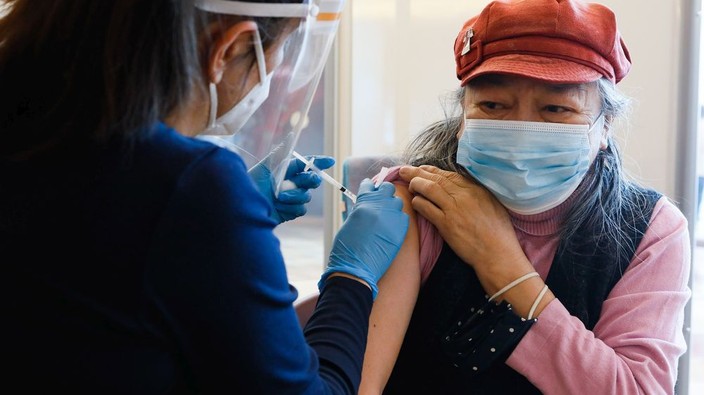will we need a covid-19 shot every year?
there's reason to believe that vaccines may produce an even better immune response than recovering from a natural infection.

margaret nicholson receives her first dose of the pfizer covid-19 vaccine from a nurse at the wabano centre for aboriginal health on feb. 18.
errol mcgihon/postmedia
/
postmedia
question: will we need to get a covid-19 vaccination every year – just like the annual flu shot?answer: new variants of the novel coronavirus that causes covid-19 are emerging all the time. and some of them have the ability to evade – at least to some degree – the protection bestowed by vaccines.as a precautionary measure, vaccine manufacturers – including pfizer-biontech and moderna – are already planning to develop new versions of their products to deal with the troubling variants.but it remains to be seen whether everyone will need to get updated vaccines, or additional booster shots, down the road.for now, the currently approved vaccines continue to provide some level of immunity.“people are worried that the vaccines won’t work. they still work, but we are still collecting data and monitoring how effective they are against certain variants,” says rob kozak, a scientist and clinical microbiologist at sunnybrook health sciences centre in toronto. “for example, we are seeing good preliminary findings that they work just fine against the u.k. variant.”the vaccines, he adds, can still lessen the severity of the illness. in particular, they reduce the risk of hospital admission and death. “that, to me, is the most important measure of their efficacy.”the variants of greatest concern are the ones that were first identified in south africa and brazil. they are known as b.1.351 and p.1 respectively.both contain mutations in the genes that produce spike proteins – the knobby protrusions that the virus uses to latch onto receptors on the surfaces of human cells.laboratory studies suggest that these variants are more resistant to the immune system’s antibodies that are the first line of defence against a foreign invader.“the antibodies will normally bind onto the spike proteins and prevent the virus from infecting cells,” explains kozak.however, the mutations on the spike proteins make it harder for the antibodies to do their job. “the antibodies don’t bind as well or you may need a lot more antibodies to neutralize the virus,” he adds. as a result, some of the tiny viral particles succeed in entering cells where they begin to replicate.this ability to skirt the immune system likely explains a recent trend observed in brazil: some people who’ve recovered from a covid-19 infection have actually become re-infected with the new p.1 variant. this suggests the immunity that people usually develop after successfully fighting off an infection may not be enough to guard against this particular variant.but, on a positive note, there is reason to believe that vaccines may produce an even better immune response than recovering from a natural infection.kozak points out that the immune system is made up of many different types of cells including “killer” t cells. “if they see that a human cell has been infected, they will go in and destroy it.”so, even if a virus gets through the first level of defence – the antibodies – it can still be stopped by the immune system’s complex array of back-up safeguards.current evidence suggests that some of the covid-19 vaccines can generate “a robust t cell response which is probably helping to control the virus,” says kozak.mario ostrowski, a professor of medicine and infectious diseases at the university of toronto, says the risks posed by the variants need to be kept in perspective.“i haven’t heard of anyone dying of an infection from a variant after they’ve been vaccinated,” he says. “in fact, the vaccines seem to be 100 per cent effective in preventing deaths.”if a new variant emerges that causes severe disease in people who’ve been vaccinated, then there would be a pressing need to re-inoculate people with an updated shot, says ostrowski.but providing such a booster vaccine now would only divert limited resources away from the critical goal of getting at least one shot into as many people as possible.“we are in a bit of an arms race,” says kozak. “the faster we can vaccinate people, the less chance the virus will have to mutate and produce more infectious variants.”over time, sars-cov-2 – the official name of the virus that causes covid-19 – will continue to evolve. experts say it’s impossible to predict whether the virus will routinely produce deadly variants that need to be brought under control with massive vaccination campaigns, similar to annual flu shots.what we do know is that other coronaviruses – which are responsible for causing some of our common colds – tend to mutate or change at a slower pace than influenza, says kozak.based on previous observations of this family of viruses, it might take three years to produce a variant that is sufficiently different to warrant a new vaccine for everyone.but regardless of what happens to sars-cov-2, the upheaval caused by covd-19 should serve as “a wake-up call,” says ostrowski. “we are going to see more pandemics in the future.”he notes that around the world “people are destroying environments and infringing on animal habitats.” the intersection of wildlife and human populations creates new opportunities for viruses to jump from one species to another.“we need to enhance our public health systems and maintain our surveillance of emerging viruses because the next pandemic could be even worse.”paul taylor is a health journalist and former patient navigation advisor at sunnybrook health sciences centre, where he provided advice and answered questions from patients and their families.this story was originally published on healthy debate. find the original story here.
 4 minute read
4 minute read





